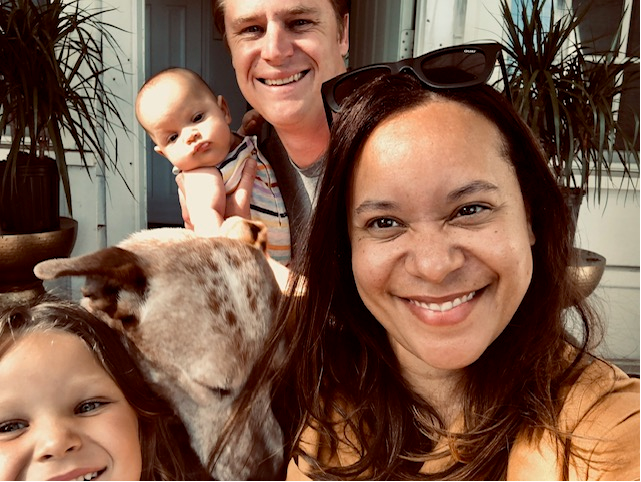Birth Detroit is on a mission to provide a better birth experience
Published on July 18, 2022 in Food and Health

After living in Washington and California, Cristina Robie returned home to Michigan to find the sense of community that she was missing on the West Coast.
“The pandemic showed us that we needed a better support system close by,” Cristina said. “We’d talked about it and by the time we made the move, I was seven or eight months pregnant with my second child.
“I wasn’t sure what that was going to mean for my birth plan. There was a lot to figure out.”
To help, Cristina’s mother connected her to the team at Birth Detroit, a grassroots organization that offers community-based maternal health care and more.
In January, Birth Detroit became one of 13 Black, Indigenous, People of Color (BIPOC) led organizations to receive funding through United Way for Southeastern Michigan’s Racial Equity Fund. An additional nine organizations received funding in June, bringing the total allocation to more than $1 million to aid those most harmed by systemic oppression in reaching their full potential.
Tonya Adair, chief people, equity and engagement officer for United Way, said the nonprofit aims to have its grantmaking and work reflect the communities it serves.
“Our commitment to the communities we serve includes ensuring equitable access to training, support, and tools that will set them up for success,” Tonya said. “We value all voices and want our entire community to be able to grow – together.”
FOR WOMEN, BY WOMEN
Birth Detroit began offering maternal health care services in 2019. The organization plays a critical role in the community – providing care for women, particularly black women – who face increased risk and mortality during pregnancy and childbirth.
Black women are three times more likely to die from a pregnancy-related cause than white women, according to the CDC. Multiple factors, including variation in quality health care, underlying chronic conditions, structural racism and implicit bias, contribute to these disparities.
With a community-based approach to maternal health care, Birth Detroit aims to be part of the solution. Birth center care improves birth outcomes, increases satisfaction – and, if it is culturally responsive, can make a life-or-death difference for people of color by reducing disparities in care.
Birth Detroit would likely have been overlooked by more traditional grant funding models, many of which require an extensive operating history. Forbes estimates that around 50 percent of nonprofits will fail within the first year due to lack of income or lack of infrastructure.
“It’s so important that organizations have access to funding and support during the early phases,” said Elon Geffrard, co-founder of Birth Detroit. She compares the needs of a new nonprofit to the needs of a newborn baby.
“When you have a baby, you don’t just throw it out into the world alone and expect for it to thrive,” Elon said. “It takes nurturing and care, and you have to be able to pay for what that baby needs.”
“The same is true for a nonprofit. Many don’t make it simply because they lack the needed support.”
FEELING SEEN
Cristina came through her first labor and delivery in Seattle with no complications, but when she looked around her hospital room, she noticed something that gave her pause.
“I was the only person of color in the room,” Cristina said. “There’s a sense of isolation and otherness that comes with that feeling no matter where you are. It’s especially true when you’re in a vulnerable position.”
For the birth of her second child, Cristina craved a different experience, one based in love and community. Birth Detroit gave her exactly that.
“The care I got from Birth Detroit made me truly feel at home and gave me a birth experience that I’ll cherish forever,” Cristina said. “I felt seen. I felt understood. I felt supported so that I could concentrate on what I was there to do – to give birth to my daughter. Everyone deserves that level of care.”
Elon is a birth doula, defined by americanpregnancy.org as “a professional trained in childbirth who provides emotional, physical, and educational support to a mother who is expecting, is experiencing labor, or has recently given birth.”
Working as a doula allows Elon to spend more time with pregnant patients than a typical doctor or nurse. When combined with midwifery, there’s an added sense of comfort and support for families that is centered in their desires and goals.
In addition to providing childbirth education, prenatal and postpartum care, Birth Detroit will soon open the city’s first birth center.
BREAKING NEW GROUND
In 2019, the organization surveyed more than 400 families in the community to gauge whether a birthing center was something that they wanted. The answer was a resounding “yes” from nearly 99 percent of people surveyed.
Of the more than 384 birth centers in the United States, less than five percent are BIPOC owned and operated. There are no Black-led birth centers in Michigan, and there are zero birth centers in Detroit.
“We were birthed out of what women in the city of Detroit said they wanted and what they said they needed,” Elon said. “That’s our roots. We will never stray from that.”
Elon said the Racial Equity Fund grant dollars, which were used to cover operational expenses, helped to build momentum at a pivotal moment in their growth. These funds can make or break organizations that are on the ground providing services, which can in turn make or break a community.
“We’re tied,” Elon said. “We’re intrinsically linked, and we’re in this together. If we’re really going to change what’s happening in our communities, there’s only one way to do it and that’s together.”
United Way plans to continue supporting BIPOC-led organizations through the Racial Equity Fund, with additional grants being released later this year. Individuals can donate to the Racial Equity Fund to help organizations like Birth Detroit thrive in their communities.